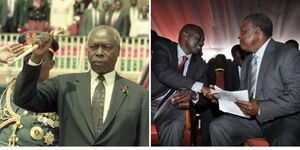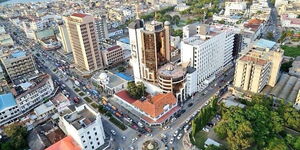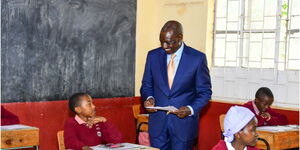President William Ruto has urged the Africa Development Bank (AfDB) to take bold steps in transforming Africa's borrowing framework, proposing measures that may stir up the status quo among international lenders.
Addressing the Africa Development Bank’s Annual Meetings on Wednesday, May 29, Ruto called on AfDB President Akinwumi Adesina to establish an Africa Credit Agency and conduct a comprehensive review of African states' Gross Domestic Product (GDP) to reflect their true economic status.
As the new African Union (AU) Champion for Institutional Reform, Ruto stressed the need for reforms in the international lending framework that has historically disadvantaged African nations with high interest rates and onerous loan conditions.
Ruto specifically requested Adesina to support the creation of a credit agency that would provide accurate assessments of African countries' creditworthiness. “Could you please support an Africa Credit Agency that will be factual about the situation in Africa,” adding “We have been profiled negatively for far too long.”
Highlighting Kenya's recent Eurobond issuance, Ruto pointed out that Kenya faced higher interest rates due to geopolitical conflicts far removed from its borders, such as the conflict in Niger. "Niger is 4,585 kilometers away from Kenya, but perceptions in places like Washington link our fates," he noted.
The Africa Credit Agency that Ruto is advocating for would function similarly to the Credit Reference Bureau (CRB). The CRB's primary role is to aid lenders in making precise and swift decisions about loan issuance by gathering and distributing credit reports that assess client creditworthiness.
Similarly, the Africa Credit Agency would compile and disseminate comprehensive credit assessments, but on a national scale, evaluating the economic health and financial reliability of African countries. This agency aims to provide an accurate representation of each country's credit status, thereby enabling fairer interest rates and lending conditions tailored to the actual economic realities of the continent.
African nations often grapple with high loan interest rates due to perceived risk factors. However, Ruto contends that with a more accurate representation of their GDP, these countries could secure fairer rates. He argued that international lenders’ misconceptions are partly to blame for the inflated rates.
“In the calculation of our GDP, the huge mineral resources that we have are not factored. The huge renewable energy resources are not factored in. Our provision of natural carbon sinks is not factored in, which is why we are often told our debt is not sustainable," he lamented.
Ruto asked Adesina to see what he can do to ensure a true evaluation of the GDP of African States. Kenya's GDP stands at an estimated 5.4 per cent in 2023 from 4.8 per cent in 2022.
The economic challenges for African countries are compounded by long-term debt accumulation, rising interest rates, and volatile credit markets. Many low-income countries are now experiencing severe debt difficulties, with about 25 per cent losing access to international bond markets. Borrowing costs for C-rated countries have surged by 14.4 percentage points since February 2022, leading to a sharp decline in growth forecasts from 3.2 per cent to 0.9 per cent.
Lending institutions often cite Africa's lack of economic diversification and low GDP per capita as reasons for the high-risk premiums. Despite rapid growth, many African economies remain heavily reliant on commodities.
The African Development Bank reported that Africa's economic growth fell to 3.2 per cent in 2023, down from 4.1 per cent in 2022, attributing this decline to political instability and external shocks like China's economic slowdown, the COVID-19 pandemic, and Russia's war in Ukraine.
Since his appointment as AU Champion for Institutional Reform in February, succeeding Rwanda's President Paul Kagame, Ruto has been tasked with driving the Comprehensive Institutional Reform Initiative, which began in 2016.












